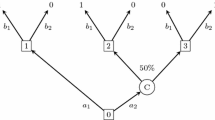Abstract
This paper considers two fundamental aspects of the analysis of dynamic choices under risk: the issue of the dynamic consistency of the strategies of a non EU maximizer, and the issue that an individual whose preferences are nonlinear in probabilities may choose a strategy which is in some appropriate sense dominated by other strategies. A proposed way of dealing with these problems, due to Karni and Safra and called ‘behavioral consistency’, is described. The implications of this notion of ‘behavioral consistency’ are explored, and it is shown that while the Karni and Safra approach obtains dynamically consistent behavior under nonlinear preferences, it may imply the choice of ‘dominated’ strategies even in very simple decision trees.
Similar content being viewed by others
References
Bell, David (1985). ‘Disappointment in Decision Making Under Uncertainty’, Operations Research 33, 1–27.
Cox, James and Epstein, Seth (1989). ‘Preference Reversal without the Independence Axiom’, American Economic Review 79, 408–426.
Grout, Paul (1982). ‘Welfare Economics of Decision Making with Changing Preferences’, Review of Economic Studies 49, 83–90.
Fishburn, Peter (1988). Nonlinear Preference and Utility Theory, Baltimore: Johns Hopkins University Press.
Hammond, Peter (1988a). ‘Consequentialism and the Independence Axiom’, in Munier (1988).
Hammond, Peter (1988b). ‘Consequentialist Foundations for Expected Utility’, Theory and Decision 25, 25–78.
Karni, Edi and Safra, Zvi (1986). ‘Vickrey Auctions in the Theory of Expected Utility with Rank-Dependent Probabilities’, Economics Letters 20, 15–18.
Karni, Edi and Safra, Zvi (1988a). ‘Behavioral Consistency in Sequential Decisions’, manuscript, Department of Political Economy, Johns Hopkins University.
Karni, Edi and Safra, Zvi (1988b). ‘Behaviorally Consistent Optimal Stopping Rules’, manuscript, Department of Economics, Tel-Aviv University.
Karni, Edi and Safra, Zvi (1988c). ‘Ascending Bid Auctions with Behaviorally Consistent Bidders’, manuscript, Department of Economics, Tel-Aviv University.
Machina, Mark (1987a). ‘Choice Under Uncertainty: Problems Solved and Unsolved’, Journal of Economic Perspectives 1, 121–154.
Machina, Mark (1987b). ‘Decision Making in the Presence of Risk’, Science 236, 537–43.
Machina, Mark (1989). ‘Dynamic Consistency and Non-Expected Utility Models of Choice under Uncertainty’, Journal of Economic Literature 27, 1622–68.
McClennen, Edward (1988). ‘Dynamic Choice and Rationality’, in Munier (1988).
Munier, Bertrand (Ed.) (1988). Risk, Decision and Rationality, Dordrecht, Holland: D. Reidel Publishing Co.
Munier, Bertrand (1989). ‘New Models of Decision Under Uncertainty: An Interpretative Essay’, European Journal of Operations Research, forthcoming.
Raiffa, Howard (1968). Decision Analysis: Introductory Lectures on Choices Under Uncertainty, Reading, Mass.: Addison-Wesley.
Seidenfeld, Teddy (1988). ‘Decision Theory without “Independence” or without Ordering: What Is the Difference?’ Economics and Philosophy 4, 367–290.
Selten, Reinhard (1975). ‘Reexamination of the Perfectness Concept for Equilibrium Points in Extensive Games’, International Journal of Game Theory 46, 25–55.
Sugden, Robert (1986). ‘New Developments in the Theory of Choice Under Uncertainty’, Bulletin of Economic Research 38, 1–24. Reprinted in Surveys in the Economics of Uncertainty, John Hey and Peter Lambert (eds.), Oxford: Basil Blackwell Ltd.
Weber, Martin and Camerer, Colin (1987). ‘Recent Developments in Modeling Preferences Under Risk’, OR Spectrum 9, 129–151.
Weber, Robert (1982). ‘The Allais Paradox, Dutch Auctions and Alpha-Utility Theory’, manuscript, Kellog's School of Management, Northwestern University.
Author information
Authors and Affiliations
Rights and permissions
About this article
Cite this article
Dardanoni, V. Implications of behavioral consistency in dynamic choice under uncertainty. Theor Decis 29, 223–234 (1990). https://doi.org/10.1007/BF00126803
Issue Date:
DOI: https://doi.org/10.1007/BF00126803




